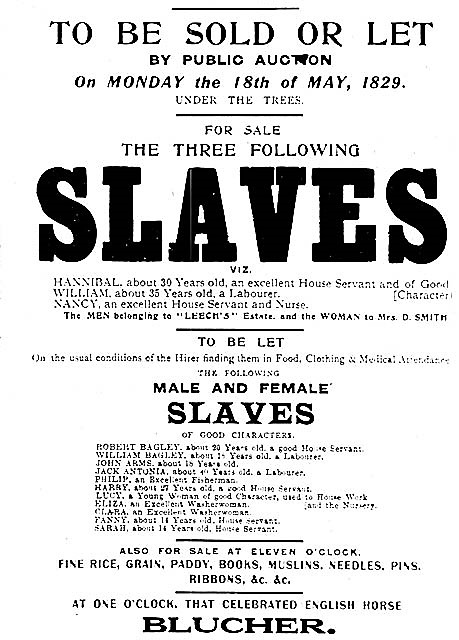
USA slave sale poster – photograph: Commonwealth Online
MEANING
to sell down the river: to betray, especially so as to benefit oneself
ORIGIN
The phrase to sell down the river originated in the history of American slavery: the river was the Mississippi and down implied the transfer of slaves from north to south.
In Language, Discourse and Power in African American Culture (2002), Marcyliena Morgan explains that a substantial internal slave trade arose in the early 19th century because it had become illegal to import slaves and because of the invention in 1793 of the cotton gin, a machine for separating cotton from its seeds:
This invention’s entry into the Southern economy was followed by the official cessation of the Atlantic slave trade in the early 1800s […]. In order for the cotton gin to realize its promise to increase the production of cotton, intensive slave labor was demanded. During this period of slavery the plantation system of the Gulf States and the Mississippi Valley expanded. By 1815, internal slave trading was a major activity within the US and between 1830 and 1840, nearly 250,000 slaves were transported over state lines. During 1850-60, over 193,000 were transported and by 1860, the slave population had reached over 4 million.
Additionally, according to B. A Phythian in A Concise Dictionary of Phrase and Fable (1993):
The harsher slave-owners of the deeper south were not choosy about accepting—and dealing with—troublesome slaves whom northern owners wished to offload, or domestic ones who could be turned into profit.
Phythian concludes that the modern sense of to sell down the river
comes from the loss of security, often including home and family, that this traffic entailed, together with the humiliation or breach of faith it implied.
The phrase to go down the river meant, of a slave, to be sold and conveyed to a plantation on the lower Mississippi. In Slavery and Crime in Missouri, 1773-1865, published in 2001, Harriet C. Frazier quotes this April 1835 entry in a journal kept by a certain Aaron S. Fry:
Suicide — A Negro man of Mr. Elies, having been sold to go down the river, attempted first to cut off both of his legs, failing to do that, cut his throat, did not entirely take his life, went a short distance and drowned himself.
And to sell a slave down the river was to sell a slave to a plantation on the lower Mississippi. The following is from a letter written by a J. F. C. in Louisville, Kentucky, published by The Christian Register and Boston Observer (Boston, Massachusetts) of 3rd September 1836:
Suppose that the most feasible and least complicated plan of emancipation should be adopted. Suppose it be enacted that after the year 1840 slavery shall cease to exist in Kentucky. What would follow? All who chose would sell their slaves down the river; the benevolent would free them, and send them away, or let them remain, as they thought best. A whole state would be redeemed from the blight and curse of the system.
I have found a puzzling use of to sell down the river in The Louisville Daily Journal (Louisville, Kentucky) of 10th April 1837 (is it an early figurative use of the phrase?):
The Vice President of the United States arrived in Louisville, on the 31st, on his way to Arkansas, to visit some of his relatives and to attend to business in that state.—Missouri Republican.
These relatives, we suppose, are the wench and her young ones, that he sold down the river a year or two ago, for attempting to run away with an Indian.
The earliest unambiguous figurative use of the phrase that I have found is from The Selling of Pat Moran, an article about baseball published in The Chicago Daily Tribune (Chicago, Illinois) of 12th May 1910 (Simon Legree is a cruel slave owner in Uncle Tom’s Cabin; or, Life Among the Lowly (1852), an anti-slavery novel by American author Harriet Beecher Stowe (1811-96)):
When they decided to sell Pat Moran they did not have the nerve to tell him, Pat, the sharer of their joys and sorrows. Murphy looked at Chance and Chance looked at Murphy, and the guilty consciences of the pair showed in the flushed cheek and the downcast eyes. […]
“Let Charlie do it,” said Chance, and they called Williams. They sent him on his sad errand and scurried into retreat. And Williams, hardened Simon Legree of baseball, even he steeling his heart to the task, sought out the unsuspecting Pat to tell him that he had been sold to Philadelphia. When he met the innocent and trustful look of the bartered backstop his nerve failed him and all he could stammer out was: “When shall we send for your trunk, Pat?” We are not given all the details of the sad scene. […]
Pat has been sold “down the river”; Pat, who has seen the most prosperous days of the Chicago Nationals, is no longer with us.
In The Small Bachelor (1927), the English writer Pelham Grenville Wodehouse (1881-1975) used the reflexive form of the phrase in the sense to deliver oneself into subjugation:
When Sigsbee Waddington married for the second time, he to all intents and purposes sold himself down the river. To call him a cipher in the home would be to give a too glowing picture of his importance. He does what his wife tells him — that and nothing more.
